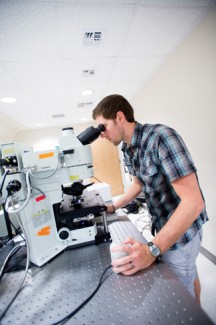A line of nerve cells pop with color as John Nuhn, a psychology student, studies a small sliver of mice retina while darkness engulfs him.

Philip Vukelich | Argonaut
John Nuhn, senior, focuses a confocal microscope on a slide of mouse eye cells. Nuhn’s summer research on mouse retinas was funded by the Idaho INBRE program.
Peter Fuerst, an assistant professor of biological sciences and Nuhn, are researching neural connections to better understand the brain.
The focus of the research looks at cone pedicles in retinas. The retina is a layer at the back of the eye that contains cells that are sensitive to light and trigger nerve impulses that pass through the optic nerve to the brain, where a visual image is formed.
The cone pedicles are complex synapses that contain bipolar and horizontal cells. When the photoreceptors are stimulated by light, the release of glutamate is decreased.
Nuhn, who wants to become a doctor, received support for his research through the Idaho INBRE Summer Fellows Program for biomedical research. The program is funded through a grant from the National Institutes of Health, Nuhn said. Students who received the grant were paid to do full-time medical research for ten weeks over the summer.
“First it helped me learn a lot about biology and the nervous system, which is good for psychology,” Nuhn said. “Second it showed me that I don’t want to be a full-time researcher, but apply research to the people and help them.”
Nuhn said he is continuing his research throughout the school year because he had such a great experience. He said he learned not just about the research he was doing but how to interact with people.
At the end of the summer, Nuhn received first place for his poster presentation at the INBRE Annual Research Conference.
Karen Den Braven, director of the National Institute for Advanced Transportation Technology, said many people don’t realize that research is not just about the research, but that it also involves writing and speaking.
“Researchers need to communicate their results through writing and presentations,” she said.
Den Braven directed many research programs throughout the summer. Programs she directed included a car plug-in that showed what emissions a car produced, how to reset the traffic signals to save on emissions and a clean snowmobile that uses a mix of gas and alcohol for fuel.
A first year program for NIATT was a Transportation Summer Camp that encouraged high school students to go into the STEM (Science, Technology, Engineering and Math) fields of study.
“The summer is a time to think about things, see how the research is going and concentrate on that research without students having to worry about homework,” Den Braven said.
She said summer research opportunities also create a close-knit community where faculty, staff and students spend time producing results.
Jack McIver, UI vice president of research and environmental development, said research programs in the summer give students the opportunity of more time to receive real life experience.
Emily Aizawa can be reached at [email protected]
